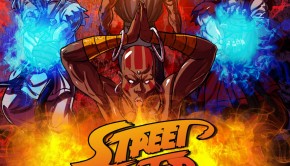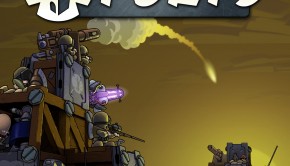Josh Whelchel Interview: Songs for the Cure
Josh Whelchel is one of the most talented composers in the indie scene. Through his work on titles such as The Spirit Engine 2, GunGirl 2, and Bonesaw, the composer has demonstrated his creativity and versatility. His other activities include producing the annual Songs for the Curealbums for cancer fundraising, remixes for games such as Super Meat Boy, and a pop side project with Melinda Hershey called Poolside.
In the artist’s most comprehensive interview to date, Whelchel discusses his scoring, remix, and original projects. In particular, he emphasises his musical inspirations, technological considerations, and collaborations on his landmark works. He also discusses his latest projects, giving a preview of his score for Ravenmark and some details on a Final Fantasy IX commemoration with OverClocked ReMix.
Interview Credits
Interview Subject: Josh Whelchel
Interviewer: Chris Greening, Matt Diener
Editor: Chris Greening
Coordination: Chris Greening
Interview Content
Chris: Josh Whelchel, many thanks for speaking to us today. First of all, could you tell us a bit about yourself? What first made you interested in music and video games?
Josh Whelchel: Thanks for having me! I’m a composer for games (just went full time this month!) with a good amount of experience scoring for smaller independent games and other various media. I started playing games on my dad’s PC, starting back with Commander Keen, Wolfenstein 3D, Blake Stone, and then DooM came around and I got stuck. I also played a lot of Myst and The 7th Guest when I was younger. I think it’s when I started playing songs from those games instead of my etudes at piano lessons that it was sort of apparent what was going to happen.

Chris: Your breakthrough in game scoring was on The Spirit Engine through an indie development community. What led you to compose for this game? What challenges did you experience creating your first full score?
Josh Whelchel: Oh man — I think my first soundtrack like that was about creating cohesive musical content, which I honestly think I failed pretty hard on (but I guess nothing I made at that age was truly cohesive).
I met Mark Pay (developer of TSE) because I was in the same small klik community at the time and I had tried my hand in creating games. Turns out you have to be pretty good at creating visual art to make a game like I wanted to, but my early attempts had music. I was aware of The Spirit Engine so I decided to email Mark to see if he needed any music. The rest just sort of happened. The challenge, I think, was more about finishing a full project like that — I had no idea where it’d take me.
Chris: The score for The Spirit Engine 2 was a massive expansion on the first soundtrack in terms of both quantity and quality. What inspired this much more elaborate approach? How do you feel you developed as a musician during the five year interim from the previous release?
Josh Whelchel: I went through some funny changes between the two The Spirit Engine soundtracks. Namely, The Spirit Engine was all tracked, and the quality wasn’t fantastic — there are a few tracks in there that stand out musically to me, but the samples *sigh*. Somewhere between them I got interested in MIDI and VSTs and so I began playing around with different tools. I had also been doing a lot of One Hour Compos on esper.net and talking with friends online to get feedback. The Spirit Engine 2 began as a tracked soundtrack, and I wrote nearly two hours of music that way before I tossed two summers of lifeguarding money on samples and a DAW.
My big changes musically were that I took two years of Music Theory, which had a positive and negative effect. I was anxious to play with proper chordal structures but it also made me lean towards writing strongly tonal music with few to no dissonances – something music truly needs.
Chris: The Spirit Engine 2 was apparently a tribute to old-school RPG scores. Could you elaborate on what other scores inspired you while creating this? Is it safe to assume you’re a major fan of the Final Fantasy series too?

Josh Whelchel: I think if you listen to the first five seconds of “A Lost Dream”, it’s obvious I like the Final Fantasy series. Other than the obvious tributes, I was really enjoying Ragnarok Online, Final Fantasy Tactics, Myst III, and about a hundred others.
Chris: The music of Bonesaw is more reminiscent of old-school Western soundtracks with its nostalgic melodies and tracker use. To what extent do you agree? How do you think the resultant sound complements the game?
Josh Whelchel: Bonesaw is my own personal love letter to Alexander Brandon (Unreal, Jazz Jackrabbit 2). I did Bonesaw as I was finishing up The Spirit Engine 2 and I was missing trackers a lot — so I went back to Modplug and remembered my original influences. Since I had learned a lot about the craft by that point and had better sample sources to work from, it was much easier to create that faux retro-meets-modern sound for me.
I think the soundtrack really helps place the player in that urgent “I’ve gotta finish this” mode, sort of like Sonic or Megaman does. The game is so simple in story and premise, and so completely addicting that without the sort of nostalgic melodic hooks and fast paced energy I was going for the soundtrack would have failed.
Chris: Your recent scores feature impressive production values. Could you elaborate on your preferred hardware and soundsets? Can it be difficult to keep up with today’s official game scores?
Josh Whelchel: I finally upgraded my PC after a good number of years only a few weeks ago, so I really only feel now that I could “keep up” with today’s hyper-realistic scores. But I definitely don’t think it’s technology that makes music great (I think everybody knows that).
My recent indulgence on orchestral and string libraries has really stemmed from my perversion with orchestral music (I’m only barely shamed to say I fell asleep to One Winged Angel as it appeared onFinal Fantasy VII: Reunion Tracks more than a few times as a kid). But it’s not just the epic-bastardized cinematic type: I’ve studied a lot of classical music with some of my favorites coming from Schubert, Wagner,… oh! And recently Fauré’s Requiem has just really taken me some place else.
I could list a lot of hardware and soundsets, but I think the most important assets are definitely your ears and your mind — if it sounds right then it’s probably working.

Chris: It appears that instrumental and vocal performances are increasingly having a role in your music too. Could you describe your experiences integrating performances into GunGirl 2? What are the advantages and disadvantages of this approach?
Josh Whelchel: The live performances stemmed from studying at a Conservatory for two years — I was entirely caught up in the fascination of live performances and the power of such talented performers. Rich Brilli, the guitarist on GunGirl 2, actually was a friend of mine who studied digital design on campus and happened to have some serious fetishes for classic rock and really feel-good music. Incidentally, it turns out he can improvise some serious guitar jams. A lot of GunGirl 2 was essentially a prolonged jam session.
Listening back to GunGirl 2, I think the advantages of live performances are pretty obvious — the game is completely over-the-top in its humor and really only cares about being a fun game at the expense of being some amazing story-telling masterpiece. Having live performances really allowed me to stay in line with the “over-the-top” vibe, as well as allowing me to tell a little bit of a story myself.
Stephanie Schoenhafer’s performance in “Libera Me” also led me to meeting two other incredibly talented vocalists who I know regularly work with — Ryan C. Connelly and Danielle Messina have just appeared on the OCRemix NiGHTs album, released on July 5, and their performance is insane. In fact, the song I released for Songs for the Cure ’11 was really an effort to get his work out sooner.
Chris: On the note of technology, you were also involved in the production of the open source Monocle Engine. Could you tell us about how implemented its audio engine? How have you made its features useful and accessible?
Josh Whelchel: Monocle’s audio engine is designed to reward the musicians and sound designers, as well as the developer. I think some of the highlights are the features that allow very fine control over every playing sound source; as a result, it’s very easy to do layers and voluming — a functionality I actually programmed for GunGirl 2 as well.
But my personal favorite is the abstraction of “Audio Decoders.” It’s extremely simple to program your own sound generator in that way and not have to worry about how to feed it to DirectSound or OpenAL or whatever — it’s all based so you can expand it easily. Also, I built a fairly simple key based encryption system on top of it, so musicians don’t have to worry about OGG/MP3/etc files being ripped from games instead of bought or at least downloaded properly. I know I spend a lot of time polishing my audio for soundtracks versus in game, so I think it’s definitely worth the extra step.

Chris: In addition to these representative works, you’ve worked on some smaller game scores too, for example your earliest publisher work, the iPhone’s SkullPogo, and several others featured in Stories Vol. 1. Do any of these stand out as landmarks to you for whatever reason?
Josh Whelchel: SkullPogo had two direct consequences: Firstly, I met Chevy Ray, the guy who ended up making FlashPunk. Chevy is a huge source if inspiration within the indie gaming community and also a great helpful guy — he also knows how to enjoy himself.
Secondly, Danny Baranowsky went out of his way to get a hold of me and let me know he enjoyed my work. This happened before he really blew up with Super Meat Boy, but it was so obvious even before that that Danny was going to be somebody we all enjoyed — he’d make a slightly naughty joke here! His work for Canabalt is incredible, although my favorite Danny B. is still Gravity Hook.
Chris: Since 2008, you have produced Songs for the Cure, a set of albums dedicated to raising funds for cancer charities. Could you elaborate on the concept of these albums and what attracted you to the cause? Have you been pleased with the attention they have received so far?
Josh Whelchel: I got started with Songs for the Cure because of my family — cancer has been present on both sides and I recently lost my grandmother to the disease.
Songs for the Cure is about focusing on the positive things in life, however — and I felt like nothing would be able to do that in the way that music does. I didn’t want to create a compilation that was one solid genre or a bunch of people singing about cancer and disease. In fact, I don’t really even require songs to be uplifting or about recovery either — I just aim to get the sums of all these incredibly talented people together.
Music on SFTC ranges from catchy mainstream to stories about sperm whales — generally it’s music and sound art for the sake of itself. It’s truly win-win because the artists get to do something different and we raise money for a great cause.
Chris: Songs for the Cure ’11 features a vast array of composers and performers, including big names such as Jake Kaufman, Danny Baranowsky, and Alexander Brandon. Was it rewarding to work with such people? Did you give them complete creative freedom or were their restrictions associated with the theme of the album?
Josh Whelchel: I think my only requirement to these people was “keep being awesome.” For example, I didn’t expect to get a soulful vocal performance from Alex, just as I wasn’t expecting ear-bleeding flamenco dubstep from Jake. More rewarding than being able to work with these guys is just knowing that, despite being incredibly busy, they are just really good guys that care about things bigger than themselves. Songs for the Cure wouldn’t be nearly as successful without the passion of the artists.

Chris: The early albums in the series mixed original compositions with game remixes. How does the creative process differ in each case? What inspired the shift towards originals with recent releases?
Josh Whelchel: Songs for the Cure actually began as a fundraiser I did shortly after I released The Spirit Engine 2: Selections. I was participating in Relay for Life and wanted to make a big impact, but wasn’t sure how to do it. It clicked one day that I could just give the music to everyone who donated $5 or more — so its history in video game music is absolute.
As we’ve gotten more recognition, it’s been a little easier to explore other genres. Part of me always wants there to be some mainstream stuff on there to help lure in those who may not be so receptive to the other genres. It became obvious this year that having a single album of such completely mixed genres wasn’t the best approach, so I split it up to the best of my ability with the help of some friends (I still don’t think there is a ‘right answer’).
I think it’s more original than previously just out of coincidence. Part of my source for artists comes from OverClocked ReMix, but a lot of them are just original guys in themselves. Songs for the Cure is not meant to be a remix album, but it doesn’t hurt to be either.
Chris: Recently, you’ve also rearranged the famous scores of several other indie composers. Could you tell us about more your remixes for Super Meat Boy, PPPPP, and BiteJacker? Did you have much communication with the original composers while creating them?
Josh Whelchel: Well, if it wasn’t completely obvious by now, Chris, Danny, Souleye, Mattias and a few other guys have a secret society going on (I fear I might be killed for saying anything!). Besides going to each other for advice and feedback, we like to help each other out in any way possible.
I think being on the Super Meat Boy soundtrack was really good for me, because it got a lot of people who wouldn’t give a crap about what I’m doing to open their ears. “Power of the Meat” was written originally as an instrumental remix that I was doing for the soundtrack when Danny had asked me. This was before I had even played the game, but somewhere when I was listening to what he was doing I became very aware of how popular it was going to become. Naturally, I didn’t want to have “just another remix,” but I tried to do something that would stand out by having my Poolside companion Melinda Hershey jump on the track.
“So Blue” on PPPPPPowerup! was a response to my desire to show that I could do something a little less “in your face” and I had a lot of fun writing that piece with Amanda. My song for BiteJacker actually is a reflection on this year’s GDC, and with a title like “Carboni vs Jäger at the Tranny Chiptune Show” I’ll leave that to your imagination.

Chris: In recent years, you’ve also established an original and remix unit called Poolside with Melinda Hershey. Could you tell us about the concept of this unit? To what extent does the album Children of the Summer reflect a different side to your musical personality?
Josh Whelchel: Poolside is really a way to publically admit my enjoyment of Top 40 style pop music (although it’s gotten pretty old to me pretty quickly) — there’s just a lot to be said for a catchy melody with a simple message. “Shine Tonight” is precisely that. Also, Poolside was an opportunity for me to work with Melinda Hershey, an incredibly gifted (and incredibly modest, coincidentally) singer.
Children of the Summer is really the result of Melinda moving to Michigan and us both wanting to have a completed archive of everything we had done together. To be incredibly honest, I feel the album leaves a lot to be desired — some of the tracks are so old that it was incredibly hard to mix them with new software versions and a rusty old computer. Keep your ears open for the Final Fantasy IXOCRemix album (if it ever arrives) and you’ll hear what I consider to be the absolute best Poolside song.
Chris: This year also marks your debut as a film composer on Robot. Could you tell us more about this film and your score for it? Are you interested in doing more projects like this in the future?
Josh Whelchel: Robot was really challenging. I wanted to create a score that was original but also had to compliment an otherwise silent film. The film had no dialogue and features a small toy robot trying to get his key to wind himself back up before he runs out of time. Telling the story musically was tricky, but incredibly rewarding.
Chris: Finally, it’s been recently announced that you are scoring two upcoming game projects, Scrollsand Ravenmark: Scourge of Estellion. Could you preview your scores for these projects? Do you think they could be your most significant works to date?
Josh Whelchel: Ravenmark is easily my favorite thing yet. I include an MP3 preview of the score exclusively here.
My work on Scrolls is still pretty early but I’m loving that too. Mattias Häggström Gerdt is the other half and is putting together music that really is inspiring me and pushing me to write stronger. We’re really excited about where it’s going to go.

Chris: Many thanks for your time today, Josh Whelchel. Is there anything else you’d like to say that hasn’t been covered? In addition, do you have any message to leave for your fans around the world?
Josh Whelchel: I should probably stop talking, so I’ll just say thanks to everyone who has supported me so far and thanks for being along for the ride. You guys have been really vocal and encouraging, and I look forward to showing you some new music — I feel like its been awhile!
Posted on July 15, 2011 by Chris Greening. Last modified on May 21, 2014.














